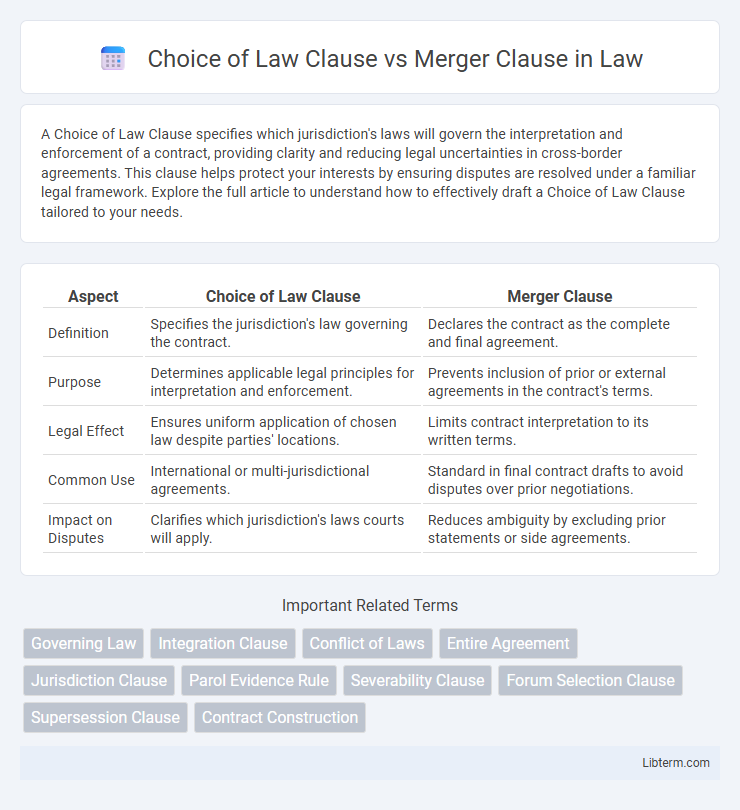A Choice of Law Clause specifies which jurisdiction's laws will govern the interpretation and enforcement of a contract, providing clarity and reducing legal uncertainties in cross-border agreements. This clause helps protect your interests by ensuring disputes are resolved under a familiar legal framework. Explore the full article to understand how to effectively draft a Choice of Law Clause tailored to your needs.
Table of Comparison
| Aspect | Choice of Law Clause | Merger Clause |
|---|---|---|
| Definition | Specifies the jurisdiction's law governing the contract. | Declares the contract as the complete and final agreement. |
| Purpose | Determines applicable legal principles for interpretation and enforcement. | Prevents inclusion of prior or external agreements in the contract's terms. |
| Legal Effect | Ensures uniform application of chosen law despite parties' locations. | Limits contract interpretation to its written terms. |
| Common Use | International or multi-jurisdictional agreements. | Standard in final contract drafts to avoid disputes over prior negotiations. |
| Impact on Disputes | Clarifies which jurisdiction's laws courts will apply. | Reduces ambiguity by excluding prior statements or side agreements. |
Introduction to Contract Clauses
Choice of Law Clauses specify which jurisdiction's laws govern the interpretation and enforcement of a contract, ensuring clarity in cross-border agreements. Merger Clauses, also known as integration clauses, confirm that the written contract represents the complete and final agreement between parties, excluding any prior negotiations or agreements. Understanding these clauses is essential for effective contract drafting and dispute resolution strategies.
Defining the Choice of Law Clause
The Choice of Law Clause specifies the jurisdiction whose laws will govern the interpretation and enforcement of a contract, ensuring predictability in legal disputes. It plays a crucial role in international and multi-jurisdictional agreements where parties seek clarity on applicable legal principles. Unlike the Merger Clause, which consolidates prior agreements into a single contract, the Choice of Law Clause exclusively addresses the applicable legal framework.
Understanding the Merger Clause
The Merger Clause, also known as the integration clause, establishes that the written contract represents the complete and final agreement between the parties, superseding all prior negotiations and agreements. It prevents any previous discussions, promises, or understandings outside the four corners of the document from being legally enforced. Understanding the Merger Clause is crucial for contract interpretation and dispute resolution, as it defines the boundaries of the agreement and limits reliance on extrinsic evidence.
Key Functions of Choice of Law Clauses
Choice of law clauses determine which jurisdiction's legal rules govern the interpretation and enforcement of a contract, ensuring predictability and consistency in dispute resolution. They establish the applicable statutory provisions and case law, reducing uncertainty and litigation risks tied to conflicting legal systems. Unlike merger clauses that confirm the completeness of the agreement, choice of law clauses specifically address the governing legal framework underpinning contractual rights and obligations.
Core Purposes of Merger Clauses
Merger clauses serve the core purpose of consolidating all prior agreements and negotiations into a single, final written contract, thereby preventing parties from introducing external or earlier agreements in legal disputes. Unlike choice of law clauses that specify the jurisdiction governing the contract, merger clauses ensure contractual clarity and limit ambiguity by confirming that the written contract represents the complete and exclusive terms agreed upon. This critical function reduces litigation risks and enhances legal certainty by precluding conflicting interpretations based on previous communications.
Differences Between Choice of Law and Merger Clauses
Choice of law clauses determine the legal jurisdiction that governs the interpretation and enforcement of the contractual agreement, specifying which state's or country's laws will apply. Merger clauses, also known as integration clauses, confirm that the written contract represents the entire and final agreement between the parties, excluding any prior or contemporaneous oral or written statements. The primary difference lies in their purpose: choice of law clauses address legal governance, while merger clauses prevent reliance on external agreements or representations outside the contract.
How Choice of Law Clauses Impact Contract Disputes
Choice of Law Clauses determine which jurisdiction's laws will govern the interpretation and enforcement of a contract, significantly affecting the resolution of contract disputes by providing predictability and reducing litigation costs. These clauses help courts avoid conflicts of law issues and ensure that parties are subject to a consistent legal framework, influencing outcomes related to contract validity, breach, and remedies. Merger Clauses, in contrast, confirm that the written contract constitutes the entire agreement, but do not dictate the governing legal principles in dispute resolution.
Legal Effects of Merger Clauses in Agreements
Merger clauses, also known as integration clauses, establish that the written contract represents the complete and final agreement between the parties, thereby excluding prior oral or written agreements from influencing the contract's interpretation. These clauses legally prevent parties from introducing evidence of earlier negotiations or understandings to alter or contradict the contract's terms, reinforcing the contract's exclusivity and clarity. In contrast, choice of law clauses specify which jurisdiction's laws will govern the contract, but do not affect the inclusion or exclusion of prior agreements like merger clauses do.
Drafting Best Practices for Both Clauses
Drafting a Choice of Law clause requires specifying the governing jurisdiction with precision to avoid ambiguity and potential disputes over applicable legal frameworks. For Merger Clauses, clearly define the agreement as the entire and exclusive contract, preventing parties from relying on prior negotiations or external agreements. Both clauses should be tailored to the contract's context, using unambiguous language to ensure enforceability and limit litigation risks.
Conclusion: Importance in Contract Drafting
Choice of law clauses and merger clauses serve distinct but equally critical roles in contract drafting, ensuring clarity and enforceability. A choice of law clause specifies the legal framework governing contract interpretation and disputes, minimizing jurisdictional uncertainty. Merger clauses confirm that the written contract represents the complete agreement, preventing reliance on prior negotiations and reinforcing contractual finality.
Choice of Law Clause Infographic

 libterm.com
libterm.com